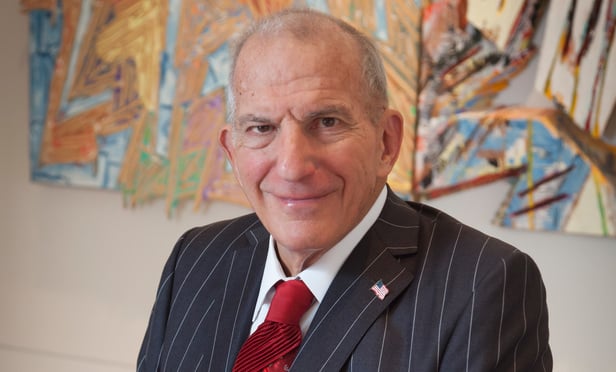Last year brought a shift in the financial fortunes of Houston-based litigation powerhouse Susman Godfrey. But the bigger shift may be in the firm’s business model, which famously embraced high-stakes contingency matters and mostly eschewed hourly billing and fixed fees.
The firm’s management recently made a strategic decision to stop aiming for the majority of its revenue to come from contingency fees, according to founder and partner Steve Susman. It has also begun seeking to represent the types of oil and gas industry clients that might have once been the firm’s adversaries, he said.
The moves come as net income at Susman Godfrey tumbled by 20 percent in 2016 from the previous year, Susman said.
Susman said he agreed to the strategy changes reluctantly.
“I have 116 lawyers at this firm. They need to feed their families,” said Susman, whose firm’s partners on average earned $2.715 million in 2015, and which pays higher associate salaries than almost any firm in the country.
“We see the writing on the wall,” Susman said about the changes, adding that the firm, which is top-heavy with 61 equity partners, reset its business strategy after the outcome of the November elections.
Four years ago, Susman reported that 80 percent of the firm’s revenues flowed from contingency fees. Since then that percentage has fallen and, going forward, it will be closer to 50 percent, said Susman, who has long been an outspoken advocate for contingency fee-based legal services.
Susman said he expects “a seismic shift” in federal laws, and possibly high court rulings, that will translate into fewer opportunities for lucrative plaintiffs-side cases best suited to contingency arrangements. The firm handles both plaintiffs and defense work, but last year it said the majority of its cases—66 percent—were for plaintiffs.
With Donald Trump in the White House and Republicans controlling the U.S. House of Representatives and the Senate, Susman forecasts that tort reform and other legislation will limit class actions, insulate financial institutions from liability, and narrow opportunities for patent infringement plaintiffs—all types of matters that have helped the firm prosper.
“If Hillary had won it would be different. You change with the times,” Susman said.
Energy Focus
To generate more hourly billing and fixed-fee revenue to replace lost contingency fee earnings, Susman Godfrey has all but lifted its prior ban on defending oil and gas industry clients, Susman said.
The firm used to avoid large oil and gas clients and some financial industry clients, in order to prevent future conflicts of interest and preserve the option of representing plaintiffs at odds with those companies. It previously represented plaintiffs seeking to stop fossil fuel use because of climate change, for example.
Those days are over. The firm now includes on its client roster Chevron Corp., Apache Corp., and other energy clients, Susman said.
“That policy of not representing oil and gas companies as defendants, we no longer rigidly enforce it,” he said.
For his part, Susman said he’ll continue the approach to billing and fees that has served him so well. “I am personally only going to be doing contingency cases,” he said.
Susman, who started his career at the firm then known as Fulbright & Jaworski, now as Norton Rose Fulbright, was a pioneer in blending Big Law scale and professionalism with a reliance on contingency work. “A lawyer can make money leveraging hours by putting a lot of people on something, or he can make money leveraging his work by getting results,” Susman told The American Lawyer back in 1993, after starting his boutique litigation firm two decades earlier.
Copyright Texas Lawyer. All rights reserved. This material may not be published, broadcast, rewritten, or redistributed.





